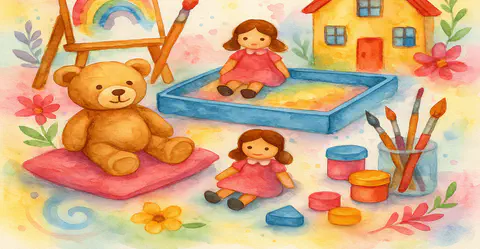Professional Play Therapy & Child Counselling in Centurion
Children don’t always have the words to express what’s inside. Our therapy services - specialized play therapy for younger children, individual counselling for older kids and teens - help them work through feelings, behaviors, and life changes in ways that feel right for them.
As a child-focused Educational Psychologist Ronita supports children and teens through play therapy and counselling that matches their age, temperament and unique needs.
What we address
We help with:
- Anxiety, fears, and phobias - for physical tension related to anxiety, consider TRE (Tension & Trauma Release Exercises)
- Anger, behavioral struggles, acting out
- Grief, loss, major life transitions (divorce, relocation)
- Social challenges like bullying or friendship struggles
- Self-esteem, identity issues, emotional regulation
If behavioral or learning issues are present, a psychoeducational assessment can help identify underlying learning difficulties that may be contributing to emotional challenges.
Play therapy for younger children
Through play, storytelling, puppets, art, and sand trays, children express what they can’t say. The therapist observes, guides, and gently helps them explore emotions, conflicts, or memories in a safe way. Over time, this helps them process feelings, build coping skills, and feel more integrated.
Therapy for older children & teens
We adapt. Therapy may involve talking, expressive techniques (journaling, art, games), or tools like cognitive strategies, depending on what resonates with your child. The goal is the same: to help them understand themselves, feel less overwhelmed, and grow stronger emotionally.
What to expect
- A parent intake meeting to understand context and goals
- Child sessions that blend structure and flexibility so your child feels in control
- Periodic parent feedback (while respecting your child’s confidentiality)
- Guidance for you (the parent) - how to support at home, how to respond in tough moments, how to reinforce progress
Everything is confidential unless there’s imminent risk, and we adhere strictly to professional ethics and legal guidelines.
Why us
You want someone who sees your child as a whole person. Ronita combines credentials with empathy. Our therapy spaces are welcoming and child-friendly, not clinical or intimidating. If, during therapy, we feel your child needs specialist attention (e.g. psychiatric assessment, educational assessment, or occupational therapy), we will guide you to trusted professionals.
Frequently Asked Questions
How long does therapy take?
Therapy duration varies widely depending on the issue and child. Some concerns may resolve in 6-10 sessions, while deeper issues (trauma, grief, complex anxiety) may take several months. We review progress regularly and adjust as needed. Most families see noticeable improvements within the first 4-6 weeks.
How long is each session?
Play therapy sessions for younger children (ages 4-10) typically last 45-50 minutes. Sessions for older children and teens may be 50-60 minutes. We keep sessions appropriately paced so children don’t feel overwhelmed.
How much does therapy cost in South Africa?
We understand therapy is an investment, and we work with families to find sustainable arrangements.
Does medical aid cover play therapy?
Many medical aids cover therapy under Mental Health or Psychology benefits (PMBs). Coverage depends on your specific plan and available benefits. We’re registered with HPCSA and provide invoices with proper ICD-10 codes for submission. Check your scheme’s annual limits and authorization requirements.
Will you tell me everything my child says?
Therapy requires confidentiality to build trust. We share general themes, progress updates, and anything you need to know to support your child at home. However, specific session details remain private unless there’s a safety concern (risk of harm). We balance your need to know with your child’s need for a safe, confidential space.
Can you provide reports for court or school?
Yes, if needed and appropriate. We can provide reports for schools, court proceedings (custody, trauma-related), or other professionals. Additional fees apply for formal report writing. Discuss this need upfront so we can structure sessions accordingly.
What if my child doesn’t want to talk?
That’s completely normal and why play therapy exists. Younger children express themselves through play, art, sand trays, and storytelling rather than talking. We meet your child where they are. Even resistant teens often open up once they feel safe and understood. If learning difficulties are contributing to behavioral issues, consider a psychoeducational assessment to understand the full picture.
How do I know if therapy is working?
You may notice changes in behavior at home or school - less tantrums, better sleep, improved mood, more communication. Progress isn’t always linear; some weeks are harder than others. We provide regular feedback and adjust our approach if something isn’t working. For children holding physical tension, TRE therapy can complement traditional therapy.
Want to start your child’s healing journey? Contact us today to explore which therapy approach would suit your child or teen. We’ll listen, explain, and match you with a path forward. Your child doesn’t have to face things alone - help can start now.
